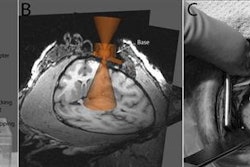This retrospective study analyzed 84 patients who received a preoperative MRI scan with gadoxetate (Eovist, Bayer HealthCare Pharmaceuticals) prior to liver resection for colorectal liver metastases between January 2010 and December 2012.
The researchers measured signal-to-noise ratio (SNR) on the noncontrast and 10-minute delayed phases, with tumor enhancement calculated as the percentage increase in SNR. The threshold for weak and strong tumor enhancement was a 12% increase in SNR between noncontrast and delayed phases.
Based on three-year survival, tumor enhancement with gadoxetate-enhanced MRI predicted disease-specific death for 61% of subjects with weak enhancement, compared with 85% of patients with strong enhancement (p = 0.01).
"Tumor enhancement on preoperative delayed-phase gadoxetate-enhanced MRI in surgical patients with colorectal liver metastases may represent a biomarker of long-term survival and may be useful for preoperative risk stratification," concluded Dr. Helen Cheung, a radiology resident at the University of Toronto, in an email to AuntMinnie.com.



















